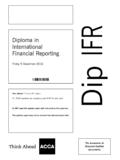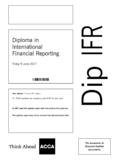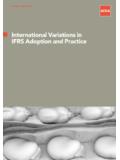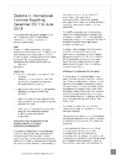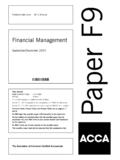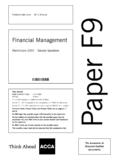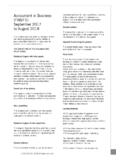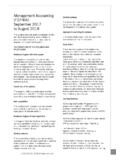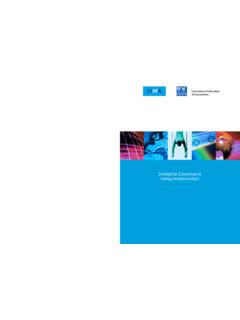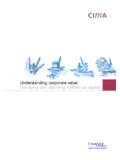Transcription of The role of accountancy in economic development
1 The role of accountancy in economic development2 This paper, prepared for the High-Level Meeting on Accounting for development in Doha, Qatar, on 22 April 2012, sets out key areas where ACCA believes professional accountancy can contribute to sustained economic FURTHER INFORMATION, CONTACTIan Welch head of policy tel: +44 (0)20 7059 5729 ABOUT ACCAACCA (the Association of Chartered Certified Accountants) is the global body for professional accountants. We aim to offer business-relevant, first-choice qualifications to people of application, ability and ambition around the world who seek a rewarding career in accountancy , finance and management. We support our 147,000 members and 424,000 students throughout their careers, providing services through a network of 83 offices and centres.
2 Our global infrastructure means that exams and support are delivered, and reputation and influence developed, at a local level, directly benefiting stakeholders wherever they are based, or plan to move to, in pursuit of new career opportunities. Our focus is on professional values, ethics, and governance, and we deliver value-added services through our global accountancy partnerships, working closely with multinational and small entities to promote global standards and support. We use our expertise and experience to work with governments, donor agencies and professional bodies to develop the global accountancy profession and to advance the public interest. Our reputation is grounded in over 100 years of providing world-class accounting and finance qualifications.
3 We champion opportunity, diversity and integrity, and our long traditions are complemented by modern thinking, backed by a diverse, global membership. By promoting our global standards, and supporting our members wherever they work, we aim to meet the current and future needs of international business. The Association of Chartered Certified Accountants, April 2012 THE ROLE OF accountancy IN economic DEVELOPMENT3 Sustainability is the theme of the UNCTAD XIII ministerial conference. ACCA is widely known for its long-standing commitment in this area. We were researching and advising on environmental reporting in 1990, long before it became an established area for accountants. This commitment remains today and we are pleased to be working with like-minded organisations who are signatories to the Corporate Sustainability Reporting Coalition led by Aviva Investors such as the Global Reporting Initiative (GRI), the UN Global Compact, UNCTAD and WWF-UK in attempting to secure clear commitments for action at the UN Rio+20 event in June.
4 If companies were to integrate sustainability information into their corporate reporting it would be a major step forward. More generally we would welcome efforts to enhance ESG (environmental, sustainability and governance) capacity similar to those for capacity building for more traditional corporate reporting and accounting. We hope that the momentum generated by the integrated reporting initiative will lead to a renewed focus on ESG issues. Lastly, we do believe that while standards can play a crucial role in enhancing reporting, the standard-setting process itself currently suffers from duplication and lack of coordination. In this confused setting, the voice of the investor, which should be at the heart of financial reporting, is all too often unheard.
5 While standards and governance should and must be set with the ultimate view of protecting the public interest, standards themselves will be most effective, in our view, when they work for business and to enhance investor wishes all delegates a happy and informative conference; we would be pleased to discuss the issues contained in this paper with any interested party. ACCA is a strong supporter of the work of UNCTAD s Intergovernmental Working Group of Experts on International Standards of Accounting and Reporting (ISAR). Both organisations believe strongly in the importance of the role that high-quality accounting, financial reporting and auditing can play in improving economic performance.
6 This paper, prepared for the High-Level Meeting on Accounting for development in Doha, Qatar, on 22 April 2012, sets out key areas where ACCA believes professional accountancy can contribute to sustained economic development . It suggests areas in which international accountancy bodies such as ACCA, UNCTAD-ISAR and the International Federation of Accountants (IFAC) can collectively promote an enhanced contribution to economic success. The issues covered here include many of those closest to the heart of ACCA. Firstly, capacity-building initiatives to enhance the accountancy profession and, in turn, the wider economies in emerging nations have been central to ACCA s strategy for more than 25 years.
7 Giving career opportunities to people of talent, whatever their background, is in our DNA, and working with local, regional and global bodies to build capacity has always been central to our approach. Put simply, strong national professions are required to develop a strong global profession. Even where professions are mature, there is always room to improve quality, and an urgent need to ensure we communicate the value we bring to business, government and an international body with members in over 170 countries, ACCA has always taken a global approach to major issues; ACCA was the first body to train its students in international financial reporting standards. So promoting the benefit of global standards has always been important to us we firmly believe that the accountancy profession can enhance its contribution to world trade by establishing globally credible standards that allow comparability of information and hence facilitate capital flows.
8 Introduction4 Before this conference, UNCTAD-ISAR said: Accounting plays an essential role in economic development . High-quality corporate reporting is key to improving transparency, facilitating the mobilization of domestic and international investment, creating a sound investment environment and fostering investor confidence, thus promoting financial stability. A strong and internationally comparable reporting system facilitates international flows of financial resources while at the same time helping to reduce corruption and mismanagement of resources. It also strengthens international competitiveness of enterprises in attracting external financing and taking advantage of international market opportunities.
9 In the wake of various financial crises continued efforts are being made towards improving the quality of corporate reporting as an important part of measures towards strengthening the international financial architecture. In this regard the implementation and application of internationally recognized standards, codes and good practices in the area of corporate reporting has been strongly encouraged as a reflection of the increasing pace of globalization and international economic integration. However, the effective adoption and implementation of such standards and codes remains a challenge for many developing countries and economies in transition as they lack some of the critical elements of corporate reporting infrastructure from weaknesses in their legal and regulatory frameworks, to lack of human capacity and relevant support institutions.
10 In the face of these challenges there is a need for a coherent approach to building capacity in this area, as well as for tools to measure and benchmark progress and identify priorities for further actions. ACCA wholly endorses these views and assessments. We see good-quality financial infrastructures as essential to the development of emerging economies as is enhanced physical infrastructure, such as improved roads and railways, cables for communications and secure pipelines for water and electricity. The development of robust governance and effective financial reporting in emerging economies is analogous to that of this physical infrastructure. If the resources invested in putting the plumbing in place cannot be accounted for, then what will stop the roads going nowhere, the energy disappearing, and the communications breaking down?

